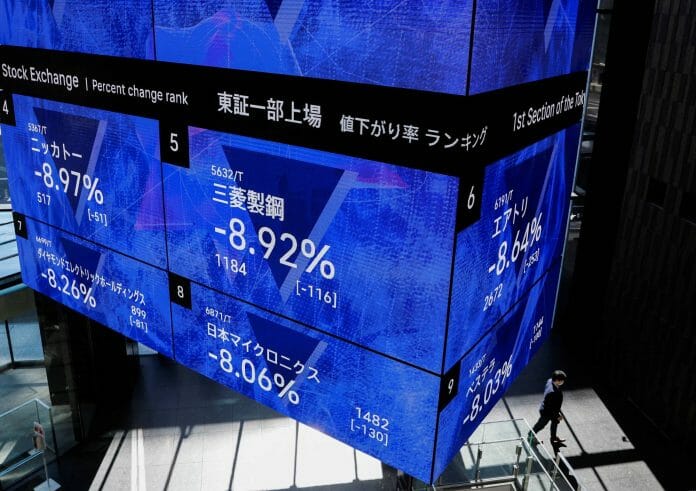Asian stocks were set to open higher Tuesday after Wall Street was bolstered by a strong start to the earnings season led by the “Magnificent Seven” big-tech companies.
Equity futures signalled that Japanese stocks, which were closed on Monday, may rally more than 1% after the yen surged back from its weakest level against the dollar in 34 years. Australian and Hong Kong shares were set for small gains in early trading after the S&P 500 continued its month-end rebound despite bets the Federal Reserve will keep interest rates higher for longer.
Early results from the US reporting season suggest that more than 80% of companies are beating expectations. First-quarter earnings are now on track to increase by 4.7% from a year ago, compared with the pre-season estimate of 3.8%, according to data compiled by Bloomberg Intelligence.
Amazon.com Inc. is seen joining the pack this week with a jump in sales. Apple Inc. likely had a tougher time, with profit expected to be lower as iPhone sales slid. Chipmakers Advanced Micro Devices Inc. and Qualcomm Inc. probably eked out revenue growth.
“Last week, big-tech enthusiasm outweighed concerns about sticky inflation,” said Chris Larkin at E*Trade from Morgan Stanley. “This week, we’ll find out if Amazon and Apple can keep that momentum going, but traders will also be taking the temperature of the latest jobs data and what the Fed has to say about inflation and rate cuts.”
Tesla Inc. soared 15% after receiving in-principle approval from Chinese officials to deploy its driver-assistance system in the world’s biggest auto market. Apple Inc. rallied on a bullish analyst call. Boeing Co. raised $10 billion from a bond sale that attracted about USD77 billion of orders.
US 10-year yields fell five basis points. The Treasury ramped up its estimate for federal borrowing for the current quarter to USD243 billion, more than most dealers had anticipated. Australia’s 10-year yield declined three basis points early Tuesday.
Investors are faced with a call on whether the weakness in stocks seen earlier this month was only a blip or if delayed policy easing will pull the market back down again. The answer may lie in the market playbook of the 1990s, when equities more than tripled in value despite years of rates that were hovering around current levels.
“One of the important things investors learned last week is that the economy is less sensitive to interest rates in this cycle,” said Jeff Roach at LPL Financial. “The Fed is ‘backed into a corner’ as some sectors of the economy appear immune to interest rates.”
At this rate, Roach expects the Fed to stay on hold longer than would happen in a normal cycle, “which increases the odds of either stagflation or a bumpy landing.”
In Asia, there’s speculation the Japanese government intervened to support its beleaguered currency for the first time since 2022. In holiday-thinned trading in Japan, the yen swung wildly, rallying more than 2% on Monday after earlier dropping as much as 1.2% to 160.17 per dollar. That’s the widest trading range since late 2022. It held the gains during the New York session.
Some traders are also looking at the possibility China will need to take an extreme and highly controversial measure to support its moribund economy — devalue the yuan in a big-bang move. Markets in the Asian powerhouse will close on Wednesday until next week for the Labor Day holidays.
US markets could remain volatile this week, but UBS continues to see the current environment as supportive for US equities — driven by solid earnings growth, a potential Fed pivot later this year, and accelerating artificial-intelligence investment.
“We remain constructive on US equities, and expect AI-related companies to drive strong earnings growth in the years ahead,” said Solita Marcelli, chief investment officer Americas at UBS Global Wealth Management. “It is key for investors to hold a healthy strategic allocation to tech stocks, but also advocate diversified exposure across regions and sectors.”
Meantime, Morgan Stanley’s Michael Wilson said the pressure from higher Treasury yields is taking the shine off an upbeat earnings season for Corporate America.
The strategist noted that although the share of companies beating analysts’ profit estimates was “strong,” the reaction in share prices was still muted as valuations were inflated following a record-breaking rally this year.
Despite concern that the Fed will be in no rush to cut rates, the appetite for technology stocks last week wasn’t lost on hedge funds. Tech saw the largest net buying since December 2022 by the group, driven by an increase in long positions and short-covering, data compiled by Goldman Sachs Group Inc.’s prime brokerage show.
The dominance of the “Magnificent Seven” may soon give way to a broadening of earnings growth that is supportive of a variety of equity asset classes, according to Glenmede’s Jason Pride and Michael Reynolds.









